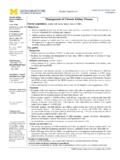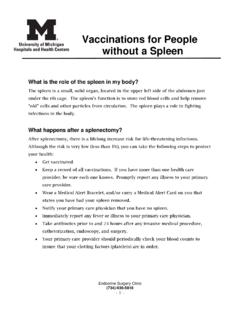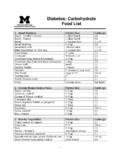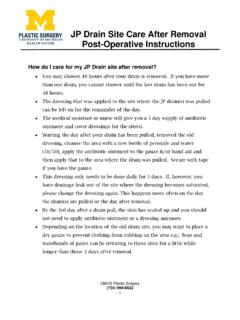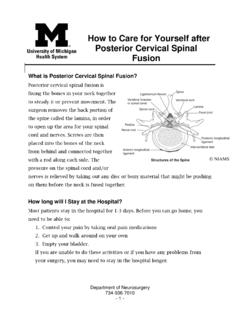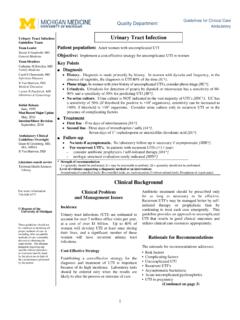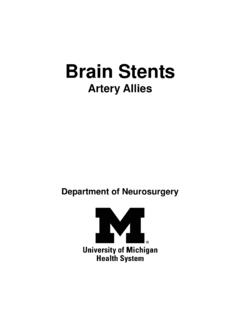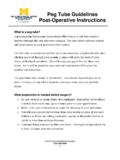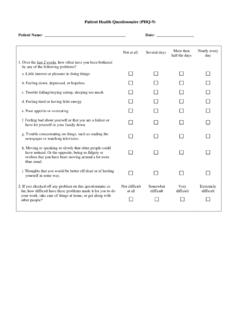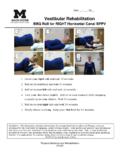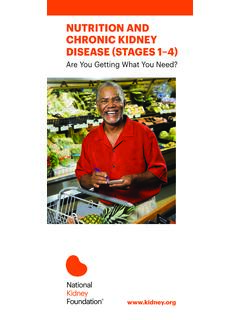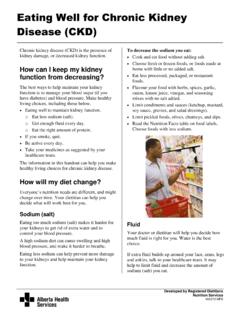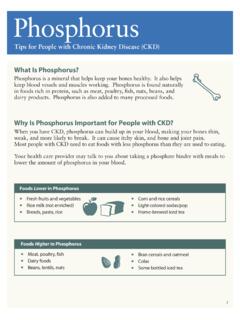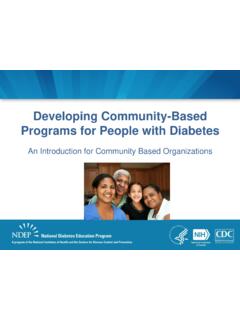Transcription of Kidney Transplant Nutrition Facts - Michigan Medicine
1 Nutrition | 1 Kidney Transplant Nutrition FactsAdequate Nutrition is important both before and after your Transplant surgery. Prior to Transplant surgery: People with good nutritional intake heal quicker after surgery It is important to continue to eat well balanced meals when you are trying to delay need for dialysis If you have questions, become frustrated or unsure of what to eat, the Transplant dietitian can help you. She is available to provide Nutrition education on Stage 4 and Stage 5 chronic Kidney disease (CKD).After a Kidney Transplant , your diet still plays a big role in managing your health. Proper Nutrition will reduce your risk of infection and rejection. If you were on dialysis and had a Kidney Transplant , you may find this diet easier to follow than the one you were on for dialysis. Long term, a well-balanced diet, consisting of lean protein, low-fat dairy products, vegetables, fruit, nuts, and a variety of grains will help maintain good health and Kidney function.
2 The DASH (Dietary Approaches to Stop Hypertension) Diet or the Mediterranean Diet are great resources to help you to follow a heart healthy and Drug InteractionsThe following foods have been shown to effect absorption of immunosuppression drugs and should be avoided: Grapefruit, or anything containing its juice (Fresca, Squirt) Pomelo Papaya Pomegranate Starfruit The following natural health products/herbal supplements (especially in pill form) have been shown to effect absorption of immunosuppression drugs and should be avoided: Astragalus Evening primrose oil Ginseng Garlic (supplement only; garlic cloves for cooking are okay) Ginger (supplement only; can be used as spice in cooking) St. John s Wort Herbal tea Green tea extract2 | NutritionDiabetes and Blood Sugar ManagementDiabetes Prior to TransplantDeclining Kidney function will often improve diabetes control, so at times people may feel their diabetes has been cured.
3 Insulin is staying in the body longer because it cannot be excreted in the urine as result of the decreased Kidney function. After Transplant , insulin will be excreted in the urine. Learning how to manage your diabetes while you are waiting for a Kidney Transplant can prevent your new Kidney from being lost to diabetes. A1C prior to Transplant should be maintained less than A1C greater than 10 can prevent you from being actively listed for Transplant . A1C is not as accurate during CKD. Glucose readings give a better picture of diabetes control. Anemia and toxins can cause A1C to appear falsely low. Your physician, dietitian, or Transplant coordinator can help connect you with a diabetic education program. Diabetes education is recommended before Kidney | 3 Elevated Blood Sugars After Kidney TransplantThe steroids and anti-rejection medications can raise blood sugars. Uncontrolled blood sugars can decrease your body s ability to heal after surgery and, if continues, can cause the new Kidney to fail.
4 Some people will develop diabetes after Transplant , so it is important to monitor your blood sugars if asked to do so. Diabetes is a problem with how your body handles sugar (glucose). Glucose is our body s main source of energy. Diabetes may not change what we eat, but when and how much we eat at a time. Morning blood sugars should be in the range of 80 to 140. A1C (test to monitor blood sugar control) should be maintained at a level less than Maintaining a healthy weight and physical activity can help control blood sugars. You will want to work with the doctor, pharmacist, and registered dietitian to keep your diet and blood sugars in good following tips can help control blood sugars: Eat a variety of foods. Choose plenty of vegetables, fruits, whole grains, low-fat milk products and lean protein or meat alternatives. Avoid skipping meals. Eat balanced meals around the same time every day.
5 Try not to go longer than 4 to 6 hours between meals. Watch portions. Fill half of your plate with vegetables, one quarter as lean protein and one quarter plate of complex carbohydrates (whole grain cereal, bread, rice, potatoes). Each meal should contain 60 grams of carbohydrates. Your body needs carbohydrates. They fuel our body s need for energy to maintain healthy organ function. Too little carbohydrate is just as dangerous as too much. It is good to limit simple carbohydrates in your diet. Simple carbohydrates include sugar, sweets, juice and soda. Complex carbohydrates, such as pasta, bread, unsweetened cereal and grains should be included in the daily diet. Don t drink your carbs. Avoid regular soda pop, juice, sports drinks or any beverages that are high in carbohydrate. Stay hydrated by drinking water and calorie-free | NutritionNutrition Goals Following Kidney TransplantPotassium Potassium often will go up and down after surgery.
6 In the beginning, Transplant medications are at slightly higher levels and may cause elevation in potassium. It will be important to limit potassium in your diet until you are sure your new Kidney is filtering out the excess potassium and you are on a stable dose of Transplant medications. You should limit potassium for 4 to 6 weeks after Transplant surgery, before slowly adding high potassium foods back into your meal plan. Typically, there is no potassium restriction after the first 6 weeks. POTASSIUM-RICH FOODS (>200 MG/SERVING)BananasOranges/Orange juiceCantaloupeHoneydewPrunesRaisinsMang oPapayaPotatoesTomato sauceSpinachKaleAvocadoBrussels sproutsNutsPeanut butterBeansLentilsLOWER-POTASSIUM FOODS (<100 MG/SERVING)ApplesauceGreen beansFrozen green peasRaspberries, blueberries, strawberriesWatermelon Cucumbers OatmealRice, white or brownEnglish muffinCarrotsBagel Waffle Cranberry juice, apple juice, grape juice Hummus Bread, whole wheat or white CheeseSpaghetti/macaroni, cookedNutrition | 5 Phosphorus Getting enough phosphorus is an important part of your meal plan.
7 If your Kidney is working properly, you will need to stop taking your phosphate binders and follow a diet high in phosphorus. As your new Kidney starts to function, your body is able to rebuild bones. While these "hungry bones" are busy gaining strength, your phosphorus could drop very low. The Transplant medications can also decrease phosphorous levels. Your Transplant nephrologist may prescribe pills to raise phosphorous levels. Many high phosphorous foods are good sources of magnesium and potassium. Goal is 1,500 mg phosphorous, 2,000 mg potassium, and 300 mg magnesium daily. * These foods are also high in potassium. If your potassium level is elevated, they should be consumed in moderation or avoided. The dietitian can help FOODS (>100 MG/SERVING)ChocolateGranolaBeef or vealPork loinBran*Beans*Lentils*Milk or yogurt (low-fat/fat-free)*Oatmeal*MAGNESIUM-RIC H FOODS (50-150 MG/SERVING)Okra (frozen)TofuChocolateBrown RiceHalibut*Spinach*Soybeans*Pumpkin seeds*Bran*Black beans*Trail mix*Avocado*Artichokes*6 | NutritionCalcium Steroids may make it difficult to absorb calcium.
8 Calcium is a mineral that helps your bones and teeth stay strong. Low levels of calcium in your blood may increase your risk of bone fractures. Aim for at least 3 servings of dairy or calcium-fortified foods per day to help keep your bones and Phosphorous Some medications may cause depletion of these minerals. so it will be necessary to use reference tables to increase consumption of foods rich in these nutrients. Sometimes your doctor will prescribe a pill to improve levels. We can provide a magnesium, phosphorous, and potassium For the first 6-8 weeks after Transplant , you will need a high protein diet to help heal. Dialysis patients will need as much or more protein following Transplant than they did during dialysis. Chronic Kidney disease (CKD) patients not on dialysis will definitely require more protein after Transplant . Protein is important for healing and strength. High doses of prednisone can cause muscle breakdown, making adequate protein intake even more crucial.
9 Six to 8 weeks after the Transplant , you should reduce protein intake to 6 to 8 ounces daily. Vitamins and Supplements Some of the anti-rejection medications you are taking can cause loss of some vitamins and minerals. A daily multiple vitamin with minerals is sometimes recommended. Do not take any vitamins with herbal additives. Check with the Transplant team before taking any protein or nutritional supplements. Sodium Monitoring and limiting sodium in your diet is an important step in taking care of your Kidney . Transplant medications such as steroids hold on to sodium and water causing swelling, edema and high blood pressure. If you are taking blood pressure medications to lower blood pressure, it is recommended to limit sodium to 2,000 milligrams FOODS Lean meat (beef, pork or lamb), turkey, chicken and fishEggs, egg whites or egg substitutesLow-fat milk, cheese and yogurtBeans and lentils Soy and tofu productsNutrition | 7 Fluids Once your new Kidney starts working, you no longer need to follow a fluid restriction.
10 After the Transplant you may develop dehydration, so you need to drink plenty of fluid every day, depending upon your individual needs. When your Kidney is working your GOAL is to drink a minimum of 8 glasses of water (64 ounces) per day, unless told otherwise by your Transplant team. Drinks that contain caffeine and/or alcohol may actually cause you to lose fluids, so do not count them in the 64 ounces of liquid you should be drinking every day. Well Water Unless you have your water checked every six months, well water should be boiled prior to drinking. Unboiled well water is safe for cooking and bathing. Some patients have found that it is convenient to boil their water and keep a pitcher in their refrigerator. You may also choose to drink bottled water (distilled or reverse osmosis are the best choices). Nutrition Concerns after Kidney TransplantDining Out and Carryout Food After TransplantEating out can be enjoyable, but there are some simple guidelines you should follow to help prevent foodborne illness: Always order meat, poultry, and fish well done.
